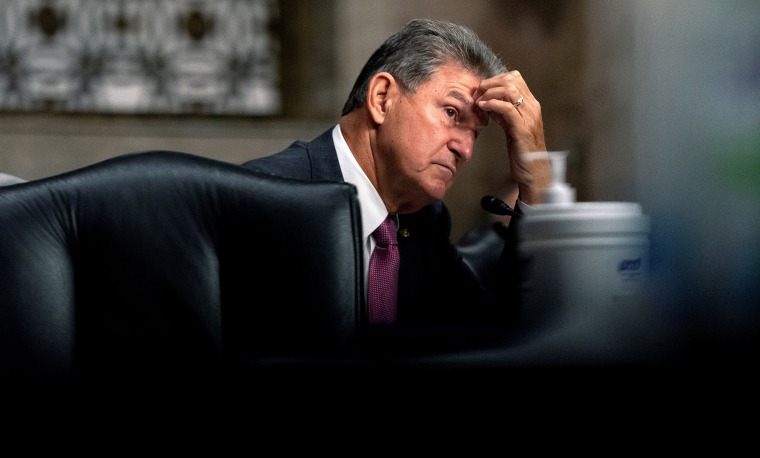This past summer, as the debate over Senate reform grew louder in Democratic circles, Sen. Kyrsten Sinema insisted that the existing rules remain intact, regardless of the consequences. The Arizona Democrat argued, among other things, that the chamber's filibuster rules were "created as a tool to bring together members of different parties to find compromise."
Senators are certainly entitled to their own opinions, but they're not entitled to just make up historical details that don't exist — and Sinema's argument about how the filibuster was created was just spectacularly and unquestionably untrue. It's not a matter of perspective: The historical record simply proved the Arizonan wrong.
Yesterday, the Senate's other Democratic opponent of overhauling the filibuster rules ran into similar trouble.
Sen. Joe Manchin of West Virginia reportedly told Fox News' Chad Pergram that the filibuster has been "the tradition of the Senate" for 232 years. According to the Capitol Hill correspondent's tweet, the conservative Democrat added, "That's what we've always had for 232 years."
This came a week after Manchin told reporters he cared about voting rights, but he was also focused on protecting "the Senate as it has operated for 232 years."
No.
Look, the debate over Senate procedures is complex, and trying to overhaul existing rules is inherently tricky for a variety of reasons. I have my opinions about how to improve the institution, but I'm mindful of the fact that others can draw competing tactical and strategic conclusions. The fact that they disagree with me doesn't necessarily mean their arguments are factually wrong.
But there are elements of the debate that exist outside the realm of subjectivity. There are certain truths from U.S. history that simply exist. Opinions about them may be interesting, but they do not change what is demonstrably true.
And in this case, what Manchin appears to have said is it at odds with what is demonstrably true.
When the Senate was created 232 years ago, the filibuster did not exist. When senators considered proposals, they held a debate and then voted. If a majority of members supported the measure it passed. The institution functioned this way for generations.
Adam Jentleson, a former top aide to the late Senate Majority Leader Harry Reid, flagged several quotes from the nation's Founding Fathers, noting that the Constitution's framers considered the idea of legislative supermajorities, before ultimately rejecting them. This quote from James Madison — widely recognized as "the father of the Constitution" — is of particular interest:
"In all cases where justice or the general good might require new laws to be passed, or active measures to be pursued, the fundamental principle of free government would be reversed. It would be no longer the majority that would rule: the power would be transferred to the minority."
Alexander Hamilton agreed.
Hamilton rebutted the idea that supermajority thresholds promote compromise, writing: "what at first sight may seem a remedy, is, in reality, a poison." It would be wrong "to subject the sense of the greater number to that of the lesser," because if "a pertinacious minority can control the opinion of a majority," the result would be "tedious delays; continual negotiation and intrigue; contemptible compromises of the public good," Hamilton wrote.
If Manchin and his allies want to argue that the nation's founders were wrong, fine. Have at it. If the West Virginian and those who agree with him genuinely believe that the Senate's traditional model of legislating was wrong, it's preferable to require supermajorities, and restoring majority rule to the institution would be a mistake, they're welcome to make that case.
What Manchin, Sinema, and others should not do, however, is argue that their position is rooted in the Senate's institutional history. It is not.
Jon Chait added overnight, "[T]he filibuster has changed repeatedly over the years. When it first appeared, unanimous consent was required to end debate, then two-thirds, then 60 percent. For the vast majority of its time, it was reserved by custom for rare instances of especially heated dissent (frequently, by Southerners to block civil rights bills.) The filibuster only came into its modern incarnation as a routine supermajority requirement during the Clinton era. Before then, legislation often passed through a majority vote."
As unsettling as it is to hear senators present ahistorical arguments, just as notable is the context in which they've been offered: Several members of the Senate Democratic Conference have spent the last several months negotiating with Manchin, hoping to convince him to help strengthen our democracy and restore the chamber's traditional model.
It appears those efforts are falling short.

